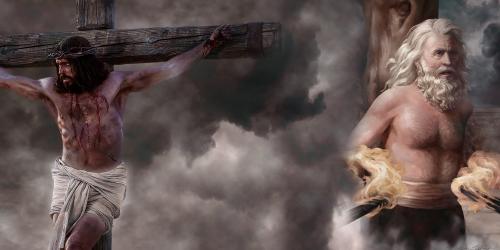2017 Mormon Theology Seminar — God Himself Shall Come Down

I’m interested in the 2017 Mormon Theology Seminar, with theme ‘God Himself Shall Come Down: Reading Mosiah 15’. I love the subject matter here. See more info on the seminar at the bycommonconsent site. I’m looking forward to the work that comes out of this Seminar. When I saw the topic, I decided I might give it a go. But I don’t have enough time to give it the treatment it deserves. And, let’s be real, I’m just not quite smart enough to pull it off. Adam Miller, my favorite Mormon theologian at the moment, runs the Mormon Theology Seminar. I can’t wait to see the content.
The ideas I would have loved to explore here are:
–Comparing the concept of incarnation of God for Mormons and a) other Christians and b) other religions, especially Hinduism. What is the motivation, the purpose, the meaning, the importance? Are there similarities? Are there important distinguishing elements?
–Compare the passages of the Book of Mormon: Mos 15:1-9, Mos 3: 5-11, Nephi’s vision in 1 Ne 11, and especially Alma 7:9-12. The point I would like to make is that an important, distinguishing aspect of this for Mormons is that the condescension of God is so that he came not just to redeem us but also relate to us.
–Comparing this very traditional Christian theology to the later very unique doctrine characterized by King Follett. And comparing to what is taught in current LDS manuals and General Conference talks over the past 20 years. It appears that the focus on the Book of Mormon that President Ezra Taft Benson brought in the 1980’s led to a trend where the speculative Nauvoo period doctrines have become less and less prominent and the more mainstream Book of Mormon type theology is emphasized.
–Abinadi’s response as Bible exegesis. Chapter 15 comes as part of Abinadi’s defense at his trial, the last part of Ch. 12 through Ch. 16. The question he is answering during this three and a half chapter passage is stated in Mos 12: 20-24. One of the priests of Noah quotes from Isaiah 52 and asks Abinadi what he thinks it means. This is part of the fourth “Song of Servant” from Isaiah. In Abinadi’s answer, he goes on to quote Isaiah 53 in full, and then goes on to explain what the entire fourth Song of Servant means. I would like to propose that this could be treated as brilliant scripture exegesis by Joseph Smith for two reasons. 1) Brilliant and unique in his ability to fold the exegesis into an interesting, complex, consistent historical narrative. 2) Brilliant in its value as pure exegesis. Joseph appears to understand the relevant material of his day, ie other Bible commentaries and analysis on this passage, he brings together aspects from different views, and creates a new, unique offering.
During 2016 with Gospel Doctrine focus on the Book of Mormon, these are all topics I thought about a lot. I love the Book of Mormon, accept it as scripture, and through study of it I am uplifted and come closer to God. I hope many of our bright, young, energetic LDS thinkers explore this topic for this Seminar. I look forward to the ideas that come out of it.